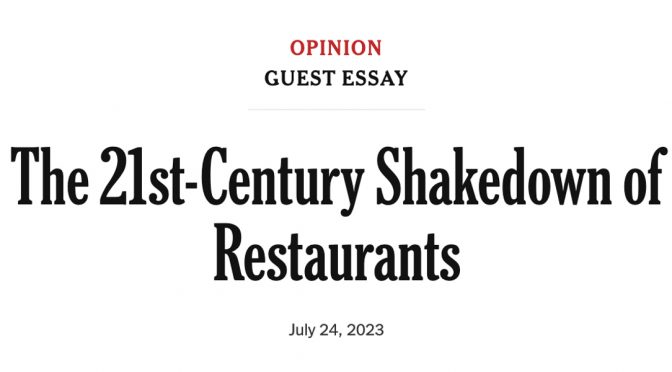By Robin Garr
LouisvilleHotBytes.com
I was putting on my disguise and puffing up my wig, getting ready to go review a restaurant, when a New York Times headline caught my eye: “The 21st-Century Shakedown of Restaurants.” (The Times’ headline is pictured above.)
“This isn’t a joke,” opinion essayist Karen Stabiner wrote. “This is a 21st-century shakedown. Here is how it works: An influencer walks into a restaurant to collect an evening’s worth of free food and drink, having promised to create social media content extolling the restaurant’s virtues.”
Dang! Have I been doing this whole restaurant criticism thing wrong all these years? I coulda made a mint! But that’s not my style. Asking a chef or owner for a payoff would have been a firing offense at Barry Bingham Jr.’s Louisville Times and Courier-Journal back in the ‘80s.
I continued the same ethic when I started LouisvilleHotBytes.com in the ‘90s, and we’ve continued a similar policy at LEO Weekly since partnering up around 2006.
Stabiner’s opinion is firm: With the possible exception of a few “first-tier” influencers who share some common ground with journalists, she’s against the whole idea. A food writer and journalist and author of the 2016 book Generation Chef: Risking It All for a New American Dream, Stabiner has the chops to judge.
You should really check out the whole article. It’s a good read, and this gift link will take you legally through The Times’ paywall. Here’s a sample that got my attention:
“In a business without boundaries, anything goes. Brian Bornemann, the chef and a co-owner of the restaurants Crudo e Nudo and Isla in Santa Monica, Calif., said that while there are reliable influencers, the ‘lower echelons’ see a free meal as a way to build their personal brands. And the most entrepreneurial influencers, whether they have sophisticated skills or merely a prospector’s zeal, offer an ascending roster of fee-based services.”
She doesn’t make this sound like an admirable line of business. I wouldn’t offer a chef an “ascending roster of fee-based services” if I could. Actually, I probably don’t even rate as an influencer since a Nigerian spear-phisher captured my old Instagram account and I couldn’t get it back because – true story – I couldn’t prove my own identity since to protect my anonymity, I never uploaded a photo of myself.
That’s been my rule since the very start: Dine as anonymously as possible (just kidding above, I don’t really wear a wig or disguise), keep a low profile, don’t reserve in my own name, and avoid buddying up with chefs and owners. It would be mighty embarrassing to turn around and extend my hand for a tip after acting like that. ??Still, this whole concept of pay-to-play influencers intrigued me. When I wrote a recent column about restaurants and social media (LouisvilleHotBytes, July 26, 2023), it didn’t even cross my mind to mention paid influencers. What a strange idea!
Is this happening right here in River City, I wondered? I reached out in person and on social media, talking to foodies and chefs and even an influencer or two, and hooboy! Did I get an earful.
I probably shouldn’t have surprised that while plenty of people had opinions, very few of them cared to be quoted by name. I get that, and so did the Times’ opinion piece: “Fear and imagination are a potent mix, and wary restaurateurs worry about retaliation if food influencers don’t get what they want.”
Said one local restaurateur: “Let’s pay someone for good reviews. At this point how can you trust anyone’s opinion? I’ve seen some locally by people that do this. Rave about a place that is average at best. You like our food? Tell people about it but I’m not gonna give you anything free for a shout out.”
Another restaurant owner laconically said, “I’ve heard that,” and left it at that. Food-industry friends from California to Buenos Aires said the practice has become commonplace. “It happens globally,” said one chef.
Some influencers can apparently get downright demanding. “I know of at least one that shows up and tells you their drinks should be free cause they’re ‘gonna post about it’,” one source said. “Then when you make them pay they write a big zero on the tip line.”
A public-relations expert at Mediaura, a local full-service digital marketing agency, isn’t impressed with paid influencers as a publicity measure. “I personally think it’s a waste of money,” they said. “It’s more important for the restaurant themselves to figure out how to do it in-house. And of course, encourage regular customers to post positive things.”

It probably won’t surprise you that influencers didn’t come running from the woodwork to talk to me, but I did have a good conversation with Todd Lanham, who goes by The Lou Guru to his nearly 5,000 followers @thelouguru on instagram.
Lanham, who grew up in Central Kentucky but moved to Louisville in 1999, says he has always enjoyed learning about the city and finding ways to connect people and help them out with recommendations around town, so he started The Lou Guru on Instagram, Facebook, Twitter and a website to share his thoughts and recommendations about local spots and help them connect with guests.
“I really find it to be an enjoyable hobby more than anything,” he said. “I definitely didn’t start it to monetize anything. I may be a bit untraditional in the space: I don’t run into many 47-year-old dads doing this stuff!”
Lanham said, he was a little shocked by the New York Times article’s reports of influencer corruption. “Personally, I’ve only experienced positives.” Restaurants usually reach out directly or through an ad agency. “If the cost of his meal is covered in return for the publicity, he’ll take care to overtip the servers. “The business owners are always very appreciative, and it’s fun for me to share their passions.”
That sounds more than fair.




